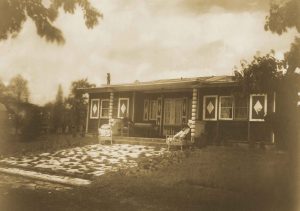
The Lake House, photograph by Lotte Jacobi, 1928
(c) (Alexander Family Archive)
In May 1993, Thomas Harding travelled to Germany with his grandmother Elsie and six of his cousins to visit a small house by a lake on the outskirts of Berlin. It had been her “soul place” as a child, Elsie told her London born grandson, then 25 years old. The Lake House was built in 1927 for Elsie Harding’s father, the prominent Jewish physician Dr. Alfred Alexander whose clients included Albert Einstein and Marlene Dietrich. The weekend retreat became a sanctuary for the Alexanders, a rustic refuge from their busy Berlin life. After the family fled in 1936, four other families lived in the house including composer Will Meisel. Later, the Berlin Wall was built through the garden. The trip was anticipated as a chance to see the holiday home one last time, to remember it as it was, but the wooden house and its garden had changed: “Elsie lamented that where there had once been raspberry bushes and cherry trees, there was now a wasteland of dead grass and rubbish,” Tom Harding recollects their arrival in Groß Glienicke, a village with a weekend house settlement from the 1920s.
Amazing stories
20 years later, in 2013, the author and journalist returned to his grandmother’s place of longing. The house had been abandoned in 2005; it was government property now, empty and derelict and hit by vandalism. In a bid to save the house from demolition, Harding began to unearth the history of the five families who had lived there: a nobleman farmer, a well to do Jewish family, a renowned Nazi composer, a widow and her children, and a Stasi informant. The amazing stories he discovered have been compiled in his internationally bestselling book The House by the Lake (Penguin Random House, 2015), which has been praised as a superb portrait of twentieth-century Germany. In 2013, members of the Alexander family came together with the local residents of Groß Glienicke and formed an association, the Alexander Haus e.V. In 2014, the house was registered as a protected monument, as a document of its historic significance as summerhouse of the president of the Berlin Chamber of Physicians Dr. Alfred Alexander. The legal proceedings were flanked by more mundane activities, first of all Cleanup Days which revealed many preserved features.
This summer, further steps were taken to fill the building with life. Funds for its restoration were secured, and recently, the State Government, the City of Potsdam and private organizations agreed on a long-term plan to develop the Alexander-Haus. The Ernst Ludwig Ehrlich Studienwerk (ELES) and Avicenna, two scholarship foundations funded by the Federal Government which support gifted Jewish respectively Muslim students, plan to use the building as a seminar facility for their education and interfaith work. “The place combines in a unique way the past and future of the Jewish community in Germany,” says Rabbi Walter Homolka, president and director of ELES.
“This is a key moment in transforming the Alexander-Haus into a centre for education and reconciliation,” explains Thomas Harding “We can say that we have the support of every level of government! The current memorandum was also the moment that we could announce that we are working with our friends at Avicenna and ELES, along with the University of Potsdam. We are very excited about these developments and look forward to moving this project forward.” The beauty of the site and its proximity to Berlin and Potsdam make the Lake House an ideal venue for interfaith workshops and academic retreats.
